Prioritizing personal hygiene and self-care can be difficult for kids and teens experiencing mental health challenges. Whether their minds are occupied by feelings of sadness, anxiety or overwhelm — or if they are just simply having a bad day — daily necessities like brushing teeth, getting dressed and practicing self-care may fall by the wayside.
Odessa, CHOC resident dog dedicated to mental health, and Janessa, child life specialist and Odessa’s handler, have noticed that some patients at the Cherese Mari Laulhere Mental Health Inpatient Center at CHOC find it difficult to accomplish hygiene or self-care tasks when they are experiencing mental health challenges. If they are struggling, it’s hard for them to accomplish their daily tasks and to cope and regulate their difficult emotions.
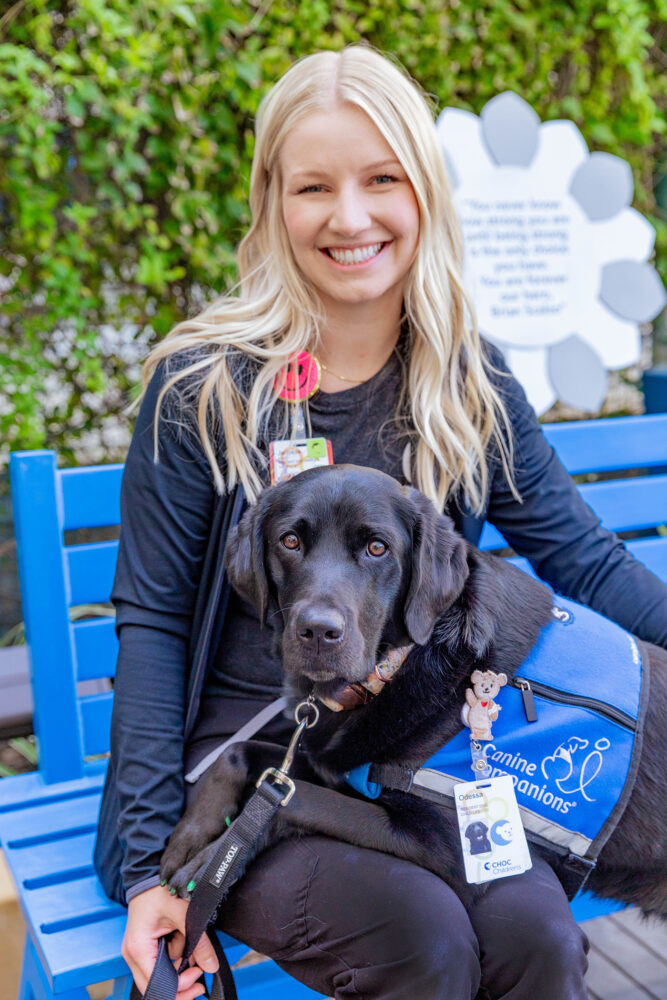
To help, Janessa will often demonstrate Odessa’s self-care routine to encourage patients to take care of themselves both physically and mentally.
“Mental illness can cause a person to be unaware of the importance of personal hygiene and unable to practice it,” says Janessa. “When we talk about activities of daily living (or self-care) with our patients, we encourage our patients to identify strengths and challenges in their own self-care routines while Odessa also identifies her strengths and weaknesses.”
Here, Janessa and Odessa offer self-care tips for all kids and teens to help them practice mindfulness and coping techniques while accomplishing their daily tasks.
Parents can help their kids prioritize self-care and personal hygiene during difficult times by encouraging the following.
Get more health tips on CHOC’s Instagram
Be mindful during your self-care routine
Odessa has a daily self-care routine like brushing her teeth, getting dressed (putting on her vest and badge), brushing her fur, cleaning her paws and even painting her toenails. As Janessa helps Odessa with her daily hygiene tasks, she demonstrates how patients can be mindful of their actions.
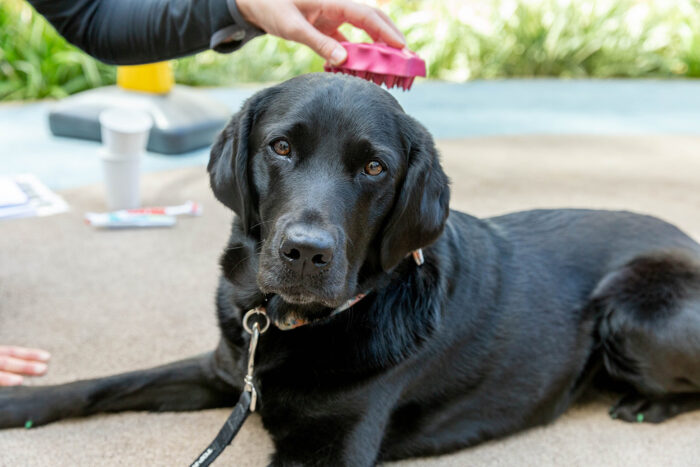
As you encourage your kids to accomplish their daily self-care tasks, ask them to think about the following:
- How hot or cold is the water during your shower or bath? What does the water sound like coming out of the faucet? How does it feel on your skin?
- How do the toothbrush bristles feel on your gums and teeth?
- What does the laundry detergent smell like on your clothes?
- How does it feel to brush through your hair?
- How do you feel emotionally when you get dressed and put on a new outfit?
When your child practices mindfulness during their routine can help build one of the most important habits in self-care: listening to your mind and body. Mindfulness helps your child focus on what’s happening in the present moment rather than revisiting the past or worrying about the future.
“Mindful practices maintain in-the-moment thoughts, feelings, bodily sensations and surroundings without judgment,” says Janessa.
After you and your child discuss how they feel during their routine, consider making a list of their daily self-care tasks to have a visual reminder of daily tasks they need to complete. Try taping it on their bathroom room mirror so they see it each morning.
Ground yourself when you’re feeling big emotions
Kids and teens can often feel dysregulated (unable to calm down) when they are feeling large emotions. A change of temperature can help to distract from your child’s hard emotions and help them feel more in control. Odessa practices this skill by chomping on her favorite snack — ice!
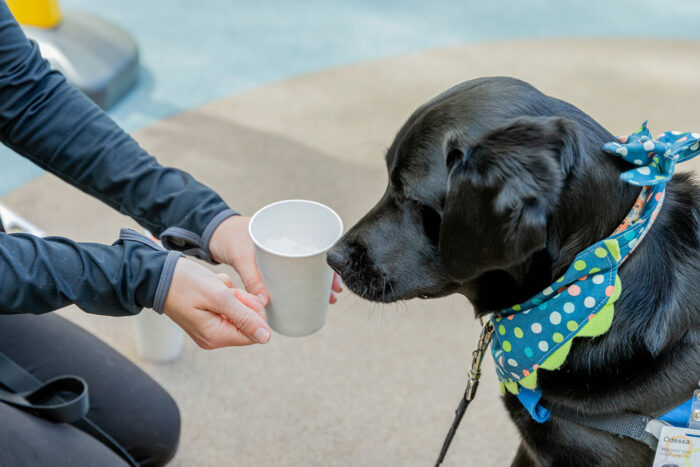
Help your kids change their temperature by:
- Taking a cold shower.
- Splashing cold water on their face.
- Going swimming or running in the sprinklers.
- Holding ice in their hands.
Name and express your emotions
Having feelings is a completely normal thing, but sometimes they can be overwhelming and hard for kids and teens to manage.
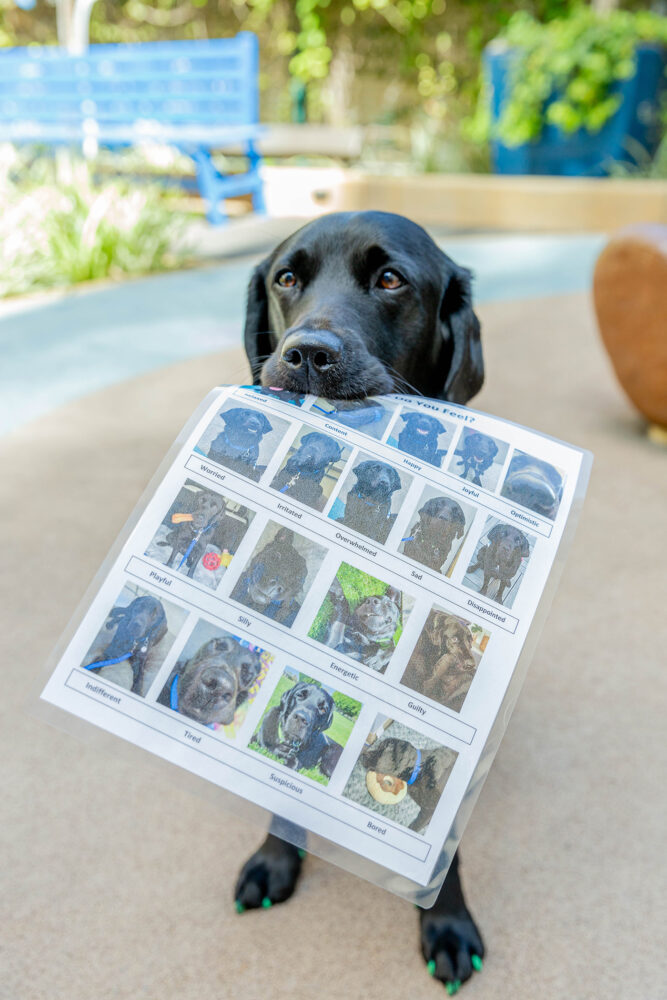
As a child life specialist, Janessa promotes healthy methods of emotional expression to encourage patients to channel their feelings through play, dialogue, arts, crafts, music and other forms of expression. One example she uses is Odessa’s feelings chart to help kids name their feelings so they can understand them better. Download CHOC’s “feelings chart” and put it up in your home where your child can easily access it, like on the fridge.
Once your child can identify their feelings, writing about them in a journal can help them process and cope.
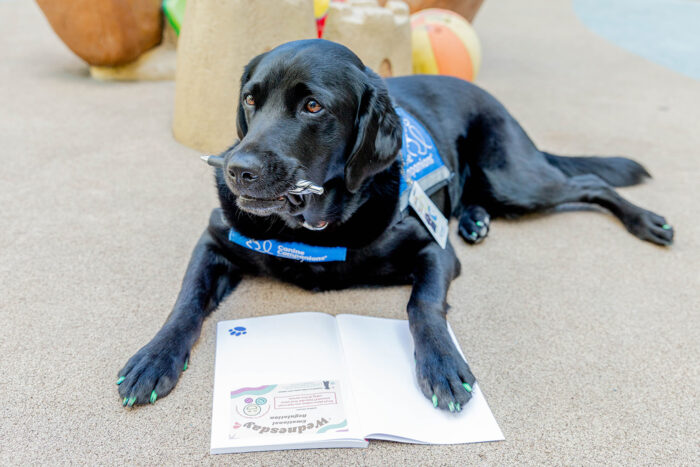
You can even offer your child a journal prompt to help spark some ideas. Janessa suggests the following journal prompts:
- What place makes you feel most peaceful? Describe that place using all five senses.
- Describe your perfect day. What is it about this day that would make you happy?
- What was a challenge in your day? How did you overcome that challenge?
- What are you grateful for right now?
- Take a moment to notice how your body feels (relaxed, tense, sore or energized). Take note of it and pay attention to how those feelings change throughout your day.
Stay “PAW-sitive”
At the Center, Odessa will often leave patients notes with “PAW-sitive a-FUR-mations.” The goals of these affirmations are to model positive self-talk, promote discussions and coping strategies, provide opportunities for connection, normalize self-reflection and growth, offer space to process emotions and feelings and to engage in positive distraction that also promotes grounding in the moment, says Janessa.
Parents can practice this technique at home by offering affirmations to their kids verbally, packing an encouraging note in their lunch, hanging a phrase on the fridge or adopting an affirmation for the week as a family.
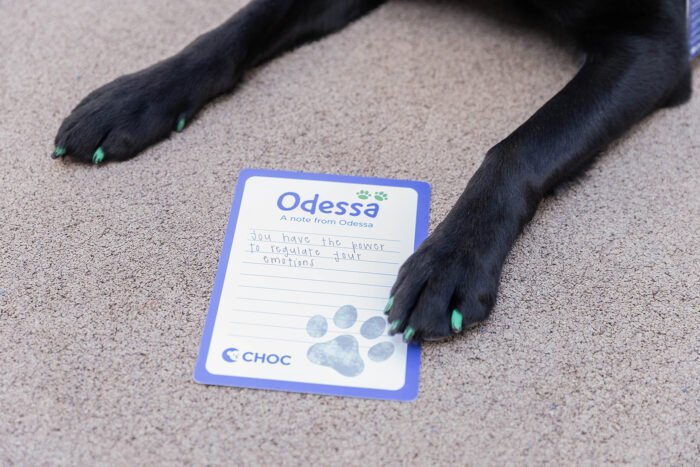
Use the following “PAW-sitive a-FUR-mations” from Odessa as inspiration to affirm your kids:
- You are strong, resilient, and capable of anything.
- I am PAWsitively proud of you.
- Take a deep breath and remind yourself that you are worthy of the help and time it takes to feel better.
- You are kind, you are smart, you are imPAWtant.
- It is PAWfectly OK to take a moment for yourself to reset and recharge.
- Change is PAWsible, don’t give up.
- You are PAWerful, beautiful, brilliant and brave.
- You are capable of doing hard things.
We know how difficult it can be for parents to watch their kids go through mental health challenges. Odessa and Janessa want you to remember to take care of yourself, too!
“It is PAWfectly OK to take a moment for yourself to reset and recharge,” says Odessa.
Get self-care tips for parents and caregivers from CHOC experts
Follow the CHOC resident dogs on Instagram
Get more expert health advice delivered to your inbox monthly by subscribing to the KidsHealth newsletter here.
Get mental health resources from CHOC pediatric experts
The mental health team at CHOC curated the following resources on mental health topics common to kids and teens, such as depression, anxiety, suicide prevention and more.





